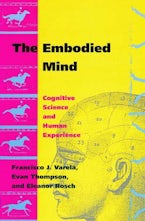
The Embodied Mind
Cognitive Science and Human Experience
Paperback
$40.00
Paperback
ISBN: 9780262720212
Pub date: November 13, 1992
Publisher: The MIT Press
328 pp., 6 x 9 in, 34 figures
Hardcover
$25.00
Hardcover
ISBN: 9780262220422
Pub date: September 26, 1991
Publisher: The MIT Press
328 pp., 6 x 9 in, 34 figures
328 pp., 6 x 9 in, 34 figures
- Paperback
- 9780262720212
- Published: November 1992
- Publisher: The MIT Press
$40.00
- Hardcover
- 9780262220422
- Published: September 1991
- Publisher: The MIT Press
$25.00


